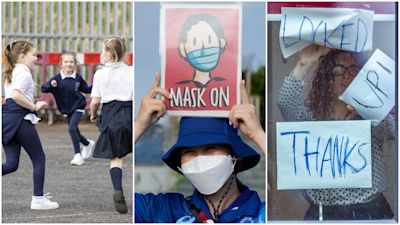What are the Covid rules in England from 16th August?

ITV News Political Reporter Shehab Khan reports on the latest changes to the Covid rules
Another raft of coronavirus changes have taken effect in England, as the country's Covid-19 immunisation campaign allows it to take another step toward freedom.
The government says it is able to make adjustments to a number of virus-mitigating-measures because more than 75% of UK adults have now been vaccinated.
Here we take a look at what's changing in England from Monday August 16, and for who:
Some self-isolation rules are being lifted for the fully vaccinated
The biggest change is that fully-vaccinated adults will be able to avoid self-isolation in some circumstances.
Anyone told by NHS contact tracers or the app to self-isolate will not need to do so, as long as they have received their second dose of a coronavirus vaccine more than 14 days prior to their contact with a positive case.
These people are advised to take a Covid-19 PCR test "as soon as possible to check if they have the virus and for variants of concern".
Those contacted will not need to self-isolate while they await the results of their test.
PCR tests can be acquired via an order for home delivery, by calling 119 or by going to a test site.
Those who develop Covid-19 symptoms should self-isolate, get a PCR test, and remain in quarantine until the result comes back.
Anyone who tests positive will still be legally required to self-isolate for ten days.
Isolation also lifts for under 18s and school bubbles will burst
Disruption to children's education is something the government is keen to avoid as it moves back to exam-based assessments next year for A-level and GCSE pupils.
Recent figures showed more than one million children in England were out of school in one week of July due coronvirus related reasons.
Which is why self-isolation rules are lifting for all under-18s, regardless of their vaccination status.
The change comes as thousands of children prepare for a return to school and college following their summer holiday.
And the requirement to segregate younger children into bubbles in order to avoid school-wide outbreaks will lift.
Social distancing will also no longer be necessary, and schools will not need to stagger start and finish times.
Secondary school and college students will still be required to take coronavirus tests at home twice a week, along with two onsite tests at the first instance when they return. Anyone who tests positive must self-isolate for 10 days.
Testing rules for schools will be reviewed at the end of September.
Those turning 18 will be treated in the same way as children until the age of 18 years and six months, to allow them time to get vaccinated.
Self-isolation may be going but don't forget your mask
People who can skip self-isolation are being advised to "consider other precautions" in order to reduce the risk of infecting those around them.
Just because someone is fully vaccinated does not mean they are fully protected from being infected with Covid-19, which means they can still pass on the virus.
As such, the government says people should consider wearing a face covering in enclosed spaces and limit contact with other people, especially with anyone who is clinically extremely vulnerable.
Isolation rules for health and care workers
Self-isolation rules are also changing for health and social workers but not in quite the same way they are for fully-vaccinated adults, due to their working environment.
Most double vaccinated health and social care staff who are close contacts of cases will be able to routinely return to work, provided they have had a negative PCR test.
Daily lateral flow tests must be taken for 10 days after being contacted, as a precaution.
Staff working with clinically extremely vulnerable patients or service users will need a risk assessment to be carried out by a designated person in the workplace before they return to work.
What about the unvaccinated?
There'll be no change to coronavirus rules for those who have not had both doses of a coronavirus vaccine.
Listen to the ITV News Coronavirus Podcast: